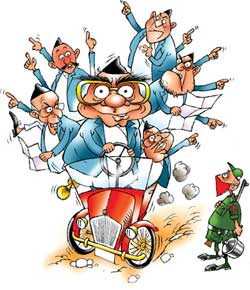 Everyone in the new Deuba government agrees on the need to restore peace and hold elections, they just don't agree on how to go about it. Some want a unilateral ceasefire to pressure the Maoists to come to the negotiating table, others say it won't work.
Everyone in the new Deuba government agrees on the need to restore peace and hold elections, they just don't agree on how to go about it. Some want a unilateral ceasefire to pressure the Maoists to come to the negotiating table, others say it won't work. Peace activists have been lobbying for a ceasefire, even if talks are not possible. They say this would allow the government to address the urgent development and rehabilitation needs of the people.
Prime Minister Deuba has to accommodate a divergence of views and vested interests among the four parties and royal nominees in his coalition. It is clear that on security matters, he needs the army's nod. One party insider told us: "We have ministers who will all be on mobiles reporting back to their bosses. It's going to be tricky."
The cabinet's first real test is next week's budget. Already, there are signs that the UML and Deuba's NC-D are pulling in different directions. The UML's deputy prime minister and finance minister, Bharat Mohan Adhikary, says he wants to unveil a "peace budget" that will take money down to local communities to revive delivery of government services.
He told us: "We will use the budget for confidence-building and channel it through grassroot groups even if they have Maoists in them." Adhikary sees it as a way to get around Maoist objections, and perhaps even a way to bring the rebels to the negotiating table.
But such a move is sure to be opposed by the army. One close Deuba aide told us: "It's not going to happen. We don't want money to reach the Maoists." The prime minister prefers an all-party presence in local bodies so that the budget can be spent on development, he said.
However, there are questions about whether village councils can function at a time when the Maoists have been assassinating mayors and ward chairmen even in the streets of the capital.
The problem is not a lack of money. Only 30 percent of last year's development budget was spent. The World Bank's $15 million Poverty Alleviation Fund is lying idle. There is clearly a need for a decisive prime minister not just to steer the government in one direction, but also to have a destination to drive towards. (With reporting by Navin Singh Khadka)


